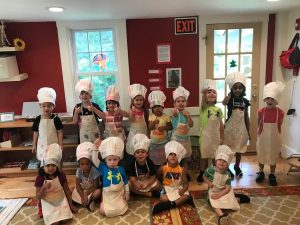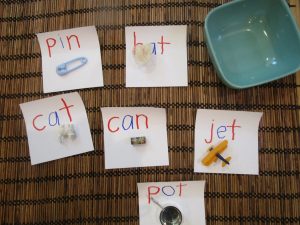Montessori
Montessori at The Taylor School
 True experiential learning: Hands-on activities keep children in touch with the concrete world as they build concentration and an increasing sense of order during this extraordinary period of cognitive, social and emotional development.
True experiential learning: Hands-on activities keep children in touch with the concrete world as they build concentration and an increasing sense of order during this extraordinary period of cognitive, social and emotional development.
Vertical age grouping: Children, as young as three and as old as six, learn side-by-side. Younger children observe higher lessons and get excited about the next level. Older students self-confidently guide younger peers. And, by grouping ages this way, teachers stay with children longer enabling them to guide a child’s continuous progress in the most productive and nurturing manner. This is also the roots of a citizenship, with the development of a mutually respectful and supportive community.
A sense of self: The Montessori principles and curriculum are designed to foster characteristics that play a critical role in emotional and cognitive growth such as perseverance, independence, self-confidence, and self-control. When young children exhibit these qualities, their intrinsic motivation leads them to their best selves in learning and to interact richly with their environment and peers, with little need for disciplinary tactics.
A sense of purpose: Everything we do and that the child chooses in the course of the day has meaning and benefit to the child. The teacher presents lessons according to a sequential plan and observes the interest and ability of each child. Children learn at their own pace, self-selecting the lessons that best match their current needs, abilities and desires. The role of the teacher is to guide each child along his or her own natural path of learning and growth.
The Areas of the Montessori Environment
 Practical Life enhances the development of task organization and cognitive order through care of self, care of the environment, exercises of grace and courtesy, and coordination of physical environment. The environment offers authentic tasks that allow children to gain the skills needed to become lifelong learners and capable thinkers with independence and cooperative abilities.
Practical Life enhances the development of task organization and cognitive order through care of self, care of the environment, exercises of grace and courtesy, and coordination of physical environment. The environment offers authentic tasks that allow children to gain the skills needed to become lifelong learners and capable thinkers with independence and cooperative abilities.- Sensorial enables the child to order, classify, and describe sensory impressions in relation to length, width, temperature, mass, color, sound, smell and taste. The purpose of sensorial work is for the child to acquire and refine their ability to absorb and engage with the environment. These skills are the bridge to other areas of learning, especially math.
- Mathematics makes use of manipulative materials to enable the child to internalize concepts of number, symbol, sequence, operations, and practical math. Moving from the concrete to the abstract the sequence of didactic materials helps the child to truly understand and enjoy numbers in their deeper sense. Through this method of teaching, we create a solid foundation for future curiosity and learning.
 Language Arts includes oral language development, written expression, reading, the study of grammar, creative dramatics, and literature. Through a specific progression of lessons the student becomes aware of the different sounds in a word. Depending on the child’s learning style, a multi sensory approach connects meaning and phonetics until grapho-motor and oral language converge in the joy of reading.
Language Arts includes oral language development, written expression, reading, the study of grammar, creative dramatics, and literature. Through a specific progression of lessons the student becomes aware of the different sounds in a word. Depending on the child’s learning style, a multi sensory approach connects meaning and phonetics until grapho-motor and oral language converge in the joy of reading.- World Studies exposes the child to basics in geography, history, and life sciences. We embrace a diversity of cultures and traditions in the spirit of sharing, community and the inter-relatedness of human experience.
- Peace and Cosmic Education: Many life skills such as listening, understanding, tolerance, empathy, inclusion, and negotiation have a specific place and importance in the Montessori environment. This aspect of the curriculum is woven throughout the areas of the classroom. This focus maintains a grounding in respectful discourse, a cornerstone of empathic leadership and citizenship.
- Please note, that as an art integrated/nature integrated environment, music and movement, art, and environmental education are infused throughout the classroom and daily routine, honoring the Montessori philosophy in practice and principle.
